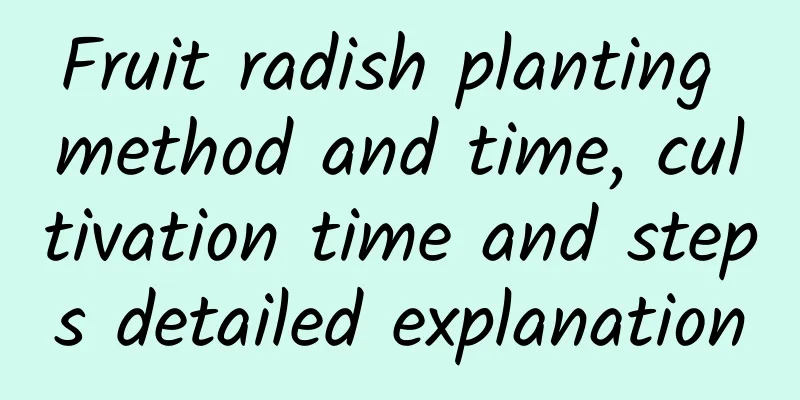Fruit radish planting method and time, cultivation time and steps detailed explanation

The best time to plant fruit radishFruit radish prefers a warm growing environment and is suitable for sowing in spring and autumn, usually around February to March in spring, or August to October in autumn. If cultivated in a greenhouse, the time limit can be relaxed. Fruit radish planting methods and key points1. Select the plot Fruit radishes like light and are not tolerant to waterlogging. Therefore, when planting them, you must choose a plot with sufficient light and convenient drainage. Before sowing, you must turn the soil in advance to ensure that the soil is loose and breathable. Also pay attention to the pH value of the soil. It is best to have neutral or slightly acidic soil. 2. Sowing method The sowing method for fruit radish is hole sowing. Dig small holes at intervals of 20-25 cm, put 2-3 seeds in each hole, then cover with a small amount of soil and wait for the seeds to germinate. Water the newly planted seeds immediately and make sure they are watered thoroughly, so that the seeds will germinate quickly. 3. Thinning and finalizing seedlings When the fruit pineapple seedlings grow 5-6 true leaves, they can be transplanted. Some of the slow-growing and underdeveloped seedlings should be removed, and only one healthy seedling should be kept in each hole. Key points for managing fruit radish1. Add water and apply fertilizer Fruit radish seedlings consume a lot of water and fertilizer during their growth period. In order to promote vigorous growth, they need to be watered every 3-5 days and topdressed with nitrogen fertilizer or organic fertilizer. In the middle and late stages of growth, appropriate topdressing of phosphorus fertilizer and potassium fertilizer should be applied. This will help the roots absorb nutrients and accelerate expansion and fruiting. 2. Field management When the fruit radish seedlings emerge, if the soil is found to be lumpy, it is necessary to weed and loosen the soil in time to make the soil loose. This can also reduce the occurrence of diseases. If diseases are found on the plants, the diseased plants can be pulled out to prevent the spread of the bacteria to other plants. |
<<: Which month is the best for planting broccoli and when is the best time for raising seedlings?
>>: Peony likes the sun or the shade. Do you like the sun or the shade?
Recommend
Transplanting method of scallion
Transplanting method of scallion When growing dee...
How do potted grape trees survive the winter? Do they need to hibernate?
1. How to spend the winter 1. Repotting: After th...
What fertilizer is good for Anthurium
What fertilizer is good for Anthurium When fertil...
How to save seeds of Danish wind chimes
1. Choose the variety When keeping seeds for Dani...
Feng Shui placement and taboos of fortune tree
1. Feng Shui placement 1. Wealth position As the ...
What to do if daffodils fall over
1. Binding and fixing If you find that the daffod...
What is the difference between Chlorophytum comosum and Panax notoginseng?
Family Chlorophytum comosum family Chlorophytum c...
Is Datura poisonous?
Is it suitable to grow Datura at home? Green flow...
The efficacy and function of jujube
one. Awakening and calming The organic acids and ...
Can I fertilize Phalaenopsis when it is blooming? How to deal with the flower sword after Phalaenopsis blooms?
1. Can I fertilize during flowering? Phalaenopsis...
How to propagate large-leafed green radish and variegated green radish by cuttings
1. Cutting method of large-leafed green radish 1....
How to grow Haworthia succulenta
1. Breeding methods 1. Soil: The roots of Haworth...
Don't throw away the "mineral water bottle" after drinking it. Use it to grow flowers. Big white roots will grow in 7 days.
So today Huahua is going to teach you a trick. Fr...
How many kilograms of millet can be produced per mu? How many kilograms of millet can be produced per mu?
How many kilograms does millet yield per mu? In r...
How to prune mimosa
Mimosa pruning time Mimosa needs to be pruned sev...









